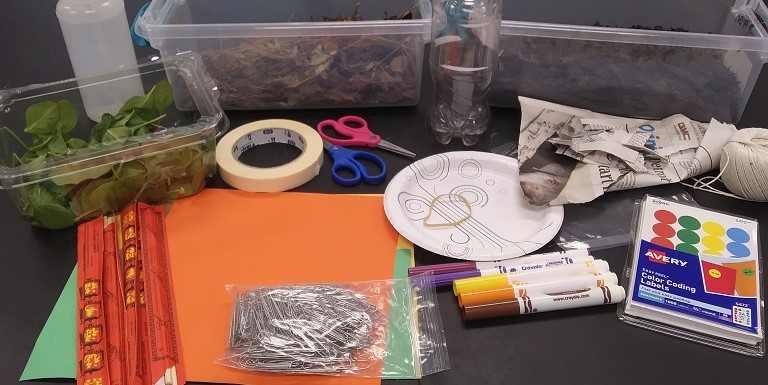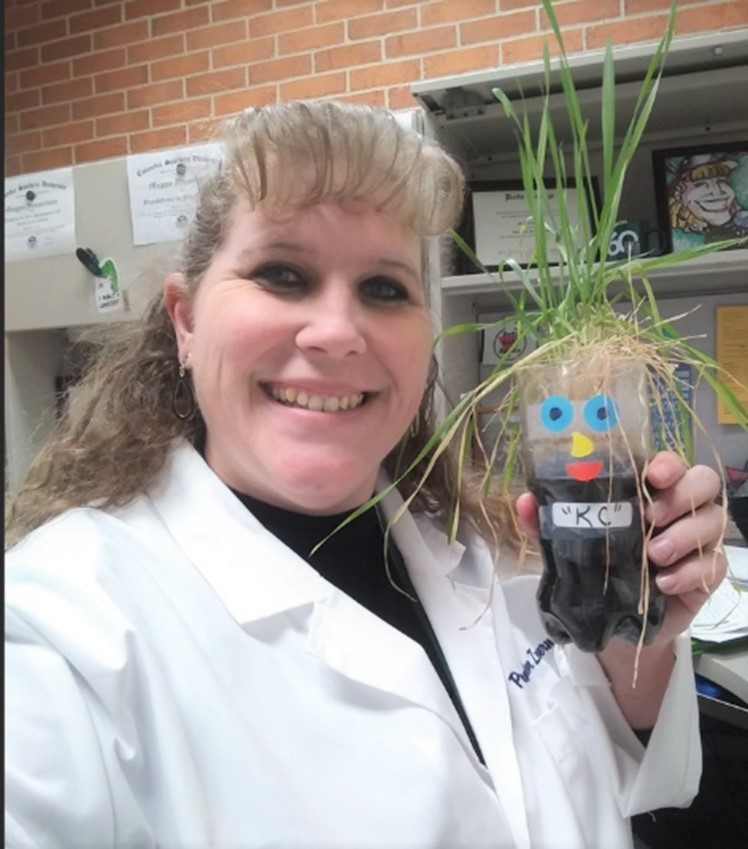Compost Kid Project Promotes Undergraduate Research Through Experimental Design

Environmental Science is a gateway class for environmental programs offered at Delta College. In the past, students taking this course were enrolled in the Environmental Science program. However, in fall 2022, my first semester teaching the class, students were enrolled to fulfill a general education requirement. At the end of class on day one, I began to reflect upon how to keep these students interested in a course that most of them had saved for last and dreaded taking. The development of a project that would get students excited about science and allow them to find value in the subject matter was my new goal. As I considered a creative way to revolutionize scientific inquiry in the classroom, the idea for the compost kid was born. The compost kid project is a semester-long activity during which students utilize the steps of the scientific method to explore a sustainable environmental topic.
In Undergraduate Research as a High-Impact Student Experience (2010), David Lopatto said that many educators “see the potential for authentic undergraduate research to be a high-impact educational practice for achieving excellence” (p. 27). Since then, “the practice of mentored student scholarship has expanded further into more diverse contexts, institution types, academic disciplines, and student demographics” (Walkington et al., 2020, para. 10). In order to promote an inclusive learning experience, community colleges should provide students with opportunities to participate in research, whether it be with a faculty member or on their own. As Adebisi (2022) noted, “The key to successful undergraduate research participation is for students to see and understand the importance of rigor, academic integrity, and responsible research conduct” (para. 9). Activities such as the compost kid project give students a chance to participate in a comprehensive research endeavor at the community college level. Furthermore, a research relationship can develop between faculty and students over the course of the semester. Faculty become mentors to the students and the students can use this networking tool as they prepare for jobs and need references. As a college student, I was mentored by a biology instructor who believed in me and helped me to believe in myself and my abilities. As part of the compost kid project, I serve as that mentor for my students.
Compost Kid Project
After lecturing about the scientific method and how scientists set up experiments and publish their results, I gave students the task of creating their own unique compost kid and keeping it alive all semester. Students were provided with the materials they needed, including a water/pop bottle, starter soil, organic materials, a graduated cylinder, and items to decorate their kid, as well as instructions and information on how composting works and the importance of layering.
Every class started with a large group discussion about the compost kids. The students developed hypotheses, collected data for 76 days, and presented their research in class. They noted what they fed their compost kids on a daily or weekly basis and reported the height of the soil along with other observations like smells and organisms living in their soil. They also discovered which organic matter breaks down faster and that the more the compost kids are fed, the more soil is produced. On average, students gained two to four inches of new soil, depending on what and how often they fed their compost kids. On the last day of class, I gave each student seeds to plant so that their compost kids can sustain usable life in the form of food that they can consume or share with others.

Maggie Zimmerman and KC the Compost Kid
Project Results
The students were actively engaged in the compost kid project. The project taught students to value how soil is made and how to manipulate it to their growing needs. They were excited to share with each other how much composted soil their kids were producing, what they were feeding their kids, and how their dogs thought they were toys or roommates would throw them out thinking they were trash. The students learned that food waste they would normally put in the trash could be fed to their compost kids and how the soil’s pH can be manipulated for growing certain plants. In addition, they discovered that if they could do this with a pop bottle, they could also do it on a larger scale, in a tote or trash can. A year later, many of the students are still composting at home and have gained a greater appreciation for soil and the processes involved in making such a valuable resource. Furthermore, the students can now say that they designed and carried out their own research project as an undergraduate, hence impacting their educational journey in a positive manner.
The project can also include cross-discipline lessons as students take a closer look at all of the components of soil and the process by which it is made. For example, guest instructors from the areas of microbiology and Earth science could team teach about soil and what is happening at a molecular level. I am currently in the process of reaching out to faculty in those areas to explore the development of learning community courses centered around the compost kid project.
This project has been tailored to meet the needs of all age groups and can be modified to meet the needs of the curriculum. This not only makes a great project for students, but it can be done at home to get family members excited about the importance of composting and that nutrient rich soil can be made at home instead of purchased at a store.
Expanding Engagement With the Compost Kid
The compost kid project has been shared with colleagues in departments across campus. I recently led a wellness activity for Delta College faculty and staff about composting and associated resources. Participants made their own compost kids, and some are considering implementing what they learned at home. Furthermore, the college is considering taking this project to the next level by building a college compost container that would be filled with kitchen and student food waste. I am advocating for my students to conduct soil testing, analyze the types of vegetables or flowers that would thrive in the soil, and report their results to the grounds department as part of this effort. The compost would be used around campus or to help fill the new community garden planned for 2024.
The project has not only impacted the students at Delta College, but has also been shared with K-5 teachers throughout Michigan with the help of the Dow Sustainability Fellows Program. This program helps connect K-12 teachers with area experts to assist them with curriculum planning or activities in the STEM areas. In collaboration with the fellows program, the project has been modified to meet the needs of the K-5 curriculum and teachers are using it for their compost unit. In addition, the class compost kid, named KC, has been to many STEM and Earth day events in the community to help promote sustainability and curriculum enrichment projects. The compose kid project is self-funded and based on volunteer hours to give back to the community that supports efforts at Delta College.
References
Adebisi, Y. A. (2022). Undergraduate students' involvement in research: Values, benefits, barriers and recommendations. Annals of Medicine and Surgery, 81. https://journals.lww.com/annals-of-medicine-and-surgery/Fulltext/2022/09000/Undergraduate_students__involvement_in_research_.67.aspx
Hensel, N. H., & Cejda, B. D. (2015). Embedding undergraduate research in the community college curriculum. Peer Review, 17(4), 27-30.
Lopatto, D., (2010). Undergraduate research as a high-impact student experience. Peer Review, 12(2), 27-30.
Walkington, H., Ackley, E., Shanahan, J. O., Stewart, K., & Hall, E. E. (2020, November 12). Undergraduate research: Ensuring a high-impact and resilient experience for all. Center for Engaged Learning Blog. Elon University. https://www.centerforengagedlearning.org/undergraduate-research-ensuring-a-high-impact-and-resilient-experience-for-all
Lead image: Compost Kid project materials
Maggie Zimmerman is a biology professor at Delta College in University Center, Michigan.
Opinions expressed in Innovation Showcase are those of the author(s) and do not necessarily reflect those of the League for Innovation in the Community College.










